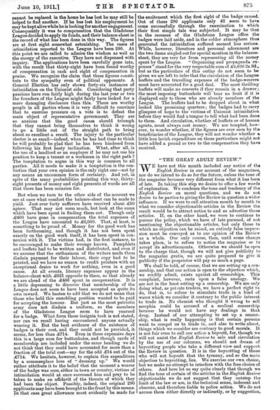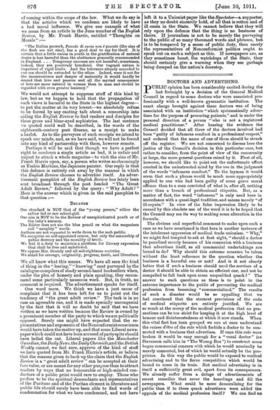"THE GREAT ADULT REVIEW."
WE have not this month included any notice of the English Review in our account of the magazines, nor do we intend to do so for the future, unless the tone of the magazine becomes very different from what it has been of late. In taking this step we desire to offer a few words of explanation. We condemn the tone and tendency of the English Review on moral questions, and we do not desire to be parties to giving the Review in question a wider influence. If we were to call attention month by month to what we consider objectionable articles in the Review the result would be to attract notice to and so advertise those articles. If, on the other hand, we were to continue to pursue the policy, which we have of late pursued, of not mentioning the objectionable articles, but only those to which no objection can be raised, an entirely false impres- sion must be conveyed as to our opinion of the Review as a whole. Our only course, then, until some change takes place, is to refuse to notice the magazine or to accept its advertisements. Otherwise we should be open to the charge that, though we will not give publicity to the magazine gratis, we are quite prepared to give it publicity if the proprietor will pay so much a page.
We shall be told, of course, that we are setting up a cen- sorship, and that our action is open to the objection which, we readily admit, exists against all censorships. This complaint, however, rests upon a false analogy. We are not in the least setting up a censorship. We are only doing what, as private traders, we have a perfect right to do, that is, to refuse to stimulate trade in a kind of wares which we consider it contrary to the public interest to trade in. No chemist who thought it wrong to sell morphia could be accused of a medical censorship because he would not have any dealings in that drug. Instead of our attempting to set up a censor- ship, what is really happening is that certain persons want to compel us to trade in, and also to write about, things which we consider are contrary to good morals. It is not fair even to call our action a boycott, for, though we will not assist the English _Review to sale and circulation by the use of our columns, we should not dream of boycotting people who take a different view and support the Review in question. It is in the boycotting of those who will not boycott that the tyranny, and so the main objection to boycotting, lies. We exercise our own choice, but we make no attempt to interfere with the free choice of others. And here let us say quite clearly that though we find the tone of certain of the articles in the English Review objectionable we do not suggest that they outstep the limit of the law or are, in the technical sense, indecent and obscene, and therefore liable to police action. We do not accuse them either directly or indirectly, or by suggestion, of coming within the scope of the law. What we do say is that the articles which we condemn are likely to have a. bad moral influence. We give one example of what we mean from an article in the June number of the English Review, by Mr. Frank Harris, entitled " Thoughts on Morals" :— " The Italian proverb, Peccato di carne non è peccato (the sins of the flesh are not sins), has a good deal to say for itself. It is certain that a little excess in youth in the gratification of natural desire is less harmful than the abstinence generally recommended in England. . . . Temporary excesses are not harmful ; sometimes, indeed, they are positively beneficial. Our vagrant nature is impatient of rigid limits. And the tolerance already accorded to one sex should be extended to the other. Indeed, were it not for the inconvenience and danger of maternity it would hardly be denied that love and passion and all the myriad consequence of love are more natural in woman than in man and should be regarded with even greater leniency."
We would not attempt to suppress stuff of this kind by law. but as we happen to hold that the propagation of such views is harmful to the State in the highest degree— to put the matter at its very lowest—we absolutely refuse to be forced by any canting talk about a censorship into aiding the English Review to find readers and disciples for these gross and blear-eyed sophistries. The last sentence we quoted could well be described, in the words of the eighteenth-century poet Greene, as a receipt to make a harlot. As to the purveyors of such receipts we intend to speak our minds, and, as we have said, we will not be forced into any kind of partnership with them, however remote.
Perhaps it will be said that though we have a perfect right to condemn a single article as bad, it is unfair and unjust to attack a whole magazine—to visit the sins of Mr. Frank Harris upon, say, a person who writes so charmingly as Yoshio 3Larkino, the Japanese painter. Our reply is that this defence is entirely cut away by the manner in which the _English Review chooses to advertise itself. An adver- tisement pamphlet of the English Review has lately been sent broadcast through the post headed "The Great Adult Review," followed by the query : "Why Adult ? " Here is the answer which is given in the said pamphlet to that question
BECA178B Our standard is NOT that of the "young person," either the callow lad or raw school-girl.
Our aim is NOT to be the Review of unsophisticated youth or of the baby's nursery. The Editor does not use the blue pencil on what the magazines call"naughty" words.
Authors are not requested to write down to the mob public.
We recognize no self-appointed censor, but only the censorship of public decency and the morality of truth.
We feel it a duty to maintain a platform for literary expression
that shall be free and unfettered.
We oppose Mrs. Grundy and all self-righteous societies.
We stand for courage, originality, progress, truth, and literature.
We all know what this means. We have all seen th3 kind of thing in the "leering," " knowing " cant purveyed by the catalogue-compilers of shady second-hand booksellers when, under the plea of honesty and plain speaking, they recom- mend some particularly nauseous work. But, in truth, no comment is required. The advertisement speaks for itself.
One word more. We think we have a just cause of complaint that it has been left for us to point out the tendency of "the great adult review." The task is in no case an agreeable one, and it is made specially uncongenial by the fact that it will no doubt be said that we have written as we have written because the Review is owned by a prominent member of the party to which we are politically opposed. Surely one might have expected that the re- presentatives and exponents of the Nonconformist conscience would have taken the matter up, and that some Liberal news- paper which could not have been accused of party spite should have belled the cat. Liberal papers like the Manchester Guardian, the Daily News, the Daily Chronicle,ancltheBritish Weekly cannot, we feel sure, approve of the kind of stuff we have quoted from Mr. Frank Harris's article, or believe that the reasons given to back up the claim that the English Review is a "great adult review" can be accepted at their face value, or are meant for any other purpose than to attract readers by ways that no honourable or high-minded con- ductors of a public print would care to employ. Those who profess tube the spiritual descendants and. representatives of the Puritans and of the Puritan element in literature and public life should surely have been able to find words of condemnation for what we have condemned, and not have left it to a Unionist paper like the Spectator a. supporter, as they no doubt sincerely hold, of all that is rotten and of ill omen in the State. We cannot believe that they will rely upon the defence that the thing is no business of theirs. If journalism is not to be merely the purveying to the public of so many thousand words and phrases, but is to be tempered by a sense of public duty, then surely the representatives of Nonconformist politics ought to speak out on such a subject as this. If newspapers are, as they sometimes boast, the watchdogs of the State, they should certainly give a warning when they see garbage being dumped on the nation's doorstep.











































 Previous page
Previous page